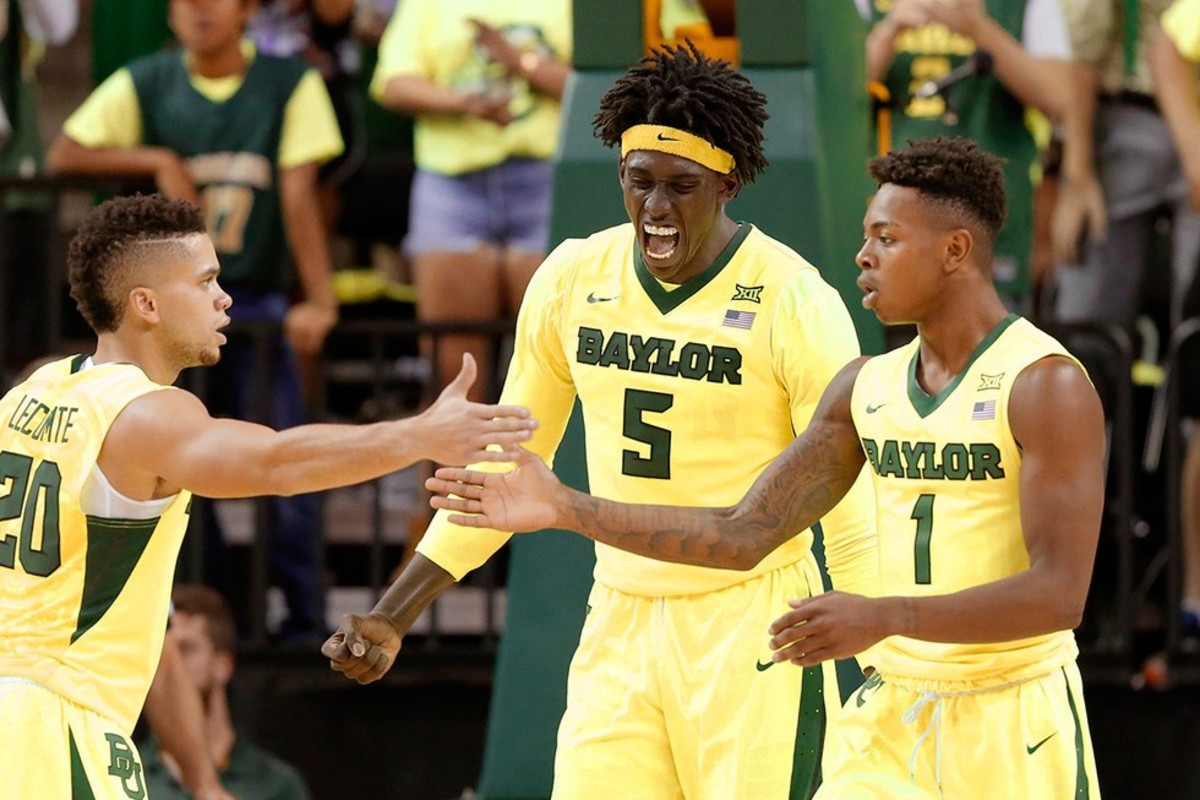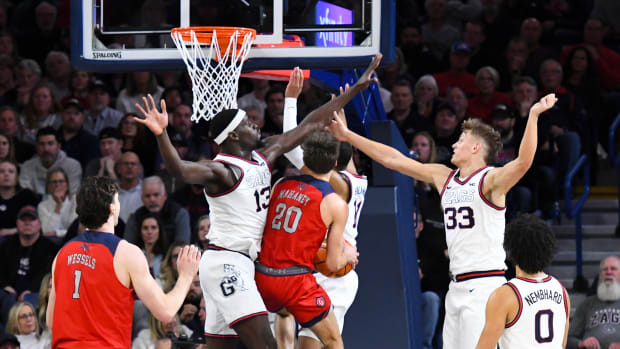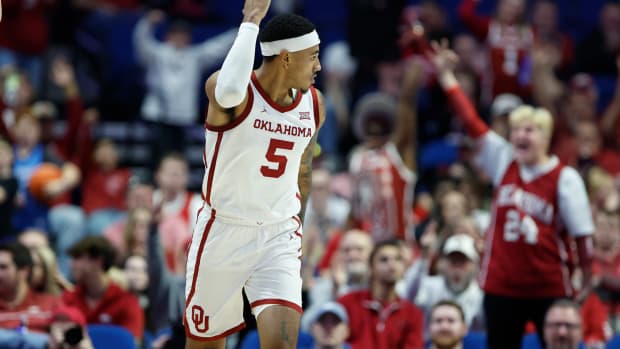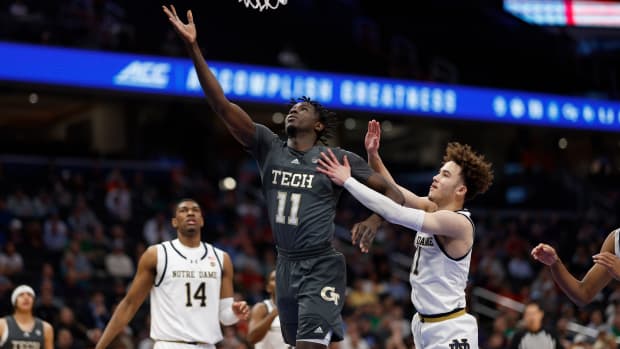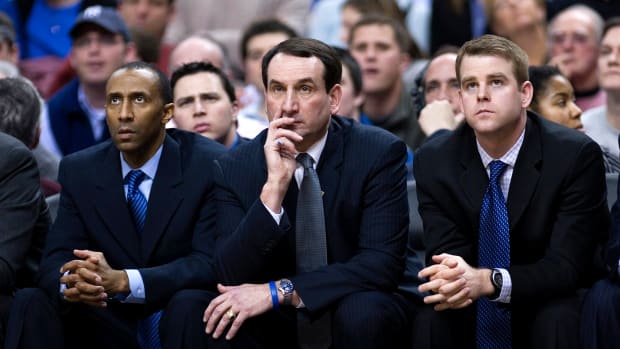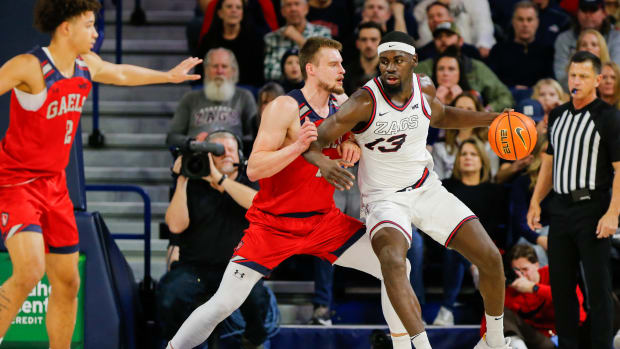Hoop Thoughts: The good and the bad for each team during the Battle 4 Atlantis
PARADISE ISLAND, Bahamas — There are worse ways to spend Thanksgiving, that's for sure.
Last week, for the sixth consecutive year, I had the pleasure of being courtside on this lovely island for the Battle 4 Atlantis while working as a color analyst for AXS TV. Besides taking place in a spectacular setting, this tournament has quickly become one of the premier events of Thanksgiving week. This year's Battle 4 Atlantis featured another stellar field as Baylor walked off with the first-place trophy courtesy of its championship game win over Louisville.
Here's something for college basketball fans to be thankful for: In this sport, a team is not eliminated from the national championship chase just because it drops a couple of games in the first month of the season. All eight teams were able to play three games in three days. That was a golden opportunity for the players and their coaches to learn important things about themselves, the kind of things you can only learn by grinding through a back-to-back-to-back gauntlet against quality competition.
After watching these teams up close for three consecutive days (four if you count the practices on Tuesday) and visiting with their coaches, I am here to report on what they learned—the good, the bad, and everything in between. It's a rough job, but someone had to do it. Herewith, in order of how they finished:
Baylor
(Defeated VCU, 71–63; Defeated Michigan State, 73–58; Defeated Louisville, 66–63)
The good: You find out a lot about a team when it faces deficits, and the Bears were behind in all three of their games. They trailed VCU by eight points late in the first half; Michigan State by 10 points midway through the first half and by three at halftime; and Louisville by 22 points late in the first half. Those are three pretty remarkable comebacks. In the title game, the Bears were rescued by their bench, which outscored the Cardinals' reserves by 36–18. Thirty-three of those 36 bench points came in the second half.
Baylor demonstrated that it's not enough just to have talent and depth. The pieces have to fit well, the players have to like each other, and everyone has to be unselfish. So give this team high marks for its intangibles. "I thought coming in that we had good chemistry, but you don't know until you're in the fire," Baylor coach Scott Drew told me after the win over Louisville. "They defer to each other out there, and even if they weren't getting shots or scoring, they were they were happy for their teammates who were, and they were continually feeding the hot guy. That's something that a team either has or it doesn't."
• Excerpt: How Charlie Scott became UNC's first black scholarship athlete
Junior forward Johnathan Motley was named the tourney's MVP following his 15-point, six-rebound performance against Louisville, but this was hardly a one-man show. With so many players to choose from, Drew could experiment with multiple lineups and try playing different ways. For example, much of Baylor's success early this season has been due to the play of 5' 11" junior point guard Manu Lecomte, but when Lecomte struggled in the first half against the Cardinals, Drew leaned more heavily on 6' 5" sophomore Jake Lindsey, who finished with five assists and zero turnovers to go along with eight points. Baylor also got a huge lift off the bench from 6' 3" sophomore guard King McClure, who played just four minutes in the semifinal win over Michigan State but had a team-high 15 points in 19 minutes the next day. And while the Bears are known for their intimidating 2–3 zone defense, Drew went almost exclusively with man-to-man against Louisville. He told me afterwards that while he might have a general idea of what type of defense he will use entering a game, he basically decides on the fly once the game begins. "Whichever is working better, we go with that," he said.
The bad: If you're a believer that quality guard play is paramount in college basketball—and I am—then there was cause for concern. The Bears committed 16 turnovers in the opener against VCU, and although they tightened that up as the week wore on, they never did find an outside touch. In the three games, they were 9 for 38 from three-point range. Lecomte was 1 for 8, and he is converting just 30.0% on the season. Lindsey has a better outside touch, he is not quite the playmaker that Lecomte is, especially in the open floor.
It's great that Baylor was able to pull this thing off, but Drew knows this team can't keep relying on comebacks. More efficient production from its backcourt would make such dramatics less necessary.
Joe Robbins/Getty
Louisville
(Def. Old Dominion, 68–62 in OT; Def. Wichita State, 62–52; Lost to Baylor, 66–63)
The good: Louisville's first-round win over ODU wasn't just ugly, it was late. The game was the last one on Wednesday and concluded around midnight. Wichita State, by contrast, played in the first game early Wednesday afternoon and throttled LSU by 35. Mentally and physically, the Cardinals should have been toast by the time their game tipped off at 2:30 Thursday afternoon, yet they jumped on the Shockers right away, building a 16-point and never looking back. Louisville held the Shockers to 32% shooting and out-rebounded them by 13. Given the quick turnaround, that speaks volumes about this team's competitive spirit.
It was interesting to watch this team develop its identity over three days. Maybe the biggest thing they learned is to turn to 6' 3" sophomore guard Donovan Mitchell down the stretch. Mitchell rescued the Cards when they faced a seven-point deficit late in the second half against Old Dominion. He also had seven steals in that game. Sitting courtside, I could see the team finally acquire a sense of defensive urgency as the minutes ticked away and the specter of an upset looked very real. Yes, it would have been nice if the Cards played that hard from the start, but at least they turned up the heat before it was too late. Now they know how hard they have to play at the defensive end in order to beat good teams—or even mediocre ones. That's a valuable lesson.
• Who are the true impact transfers this season?
The bad: The reason Louisville needs to be so good defensively is that this is a very suspect offensive team. Rick Pitino has spent much of the preseason extolling Mitchell's dramatically improved shooting, and though he has raised his percentage to 34.3 after shooting 25.0 from behind the arc as a freshman, the jury is out on just how dependable he is in that regard. (Mitchell was 7 for 19 from three in The Bahamas.) By contrast, 6' 7" sophomore forward Deng Adel was awful, making just 6 of his 28 field goal attempts and, worse, attempting only five total free throws in the three games. I don't know who is telling Adel that he should shoot fall-away jumpers as opposed to using his length and athleticism to get to the tin, but I highly doubt it's Rick Pitino.
The Cardinals' struggles in the halfcourt led them to fritter away that huge lead against Baylor. Freshman forward V.J. King hit a couple of timely buckets in the second half, but he undermined that with some defensive lapses, which prompted Pitino to park him on the bench. Ditto for 6' 9" junior forward Jaylen Johnson, who is Louisville's best post scorer but also faces a quick hook if he takes a bad shot. Pitino said after the loss to Baylor that his inability to trust his players shortened his bench, thereby wearing down the guys who were playing heavy minutes. Hence the second-half collapse. The good news is that halfcourt offensive problems can be fixed with time and repetitions, but you have to wonder what blowing a big lead like that will do to this team's confidence.
Michigan State
(Def. St. John's 73–62; Lost to Baylor, 73–58; Def. Wichita State, 77–72)
The good: Michigan State's win over Wichita State should dispel the notion that winning a consolation game is no consolation. This team has been hurting in the early going after blowing a big early lead against Arizona in Hawaii, getting embarrassed by Kentucky in Madison Square Garden and then blowing another double-digit lead to Baylor in the semifinal. Against the Shockers on Friday, the Spartans once again dashed out to an 18-point lead with just under 12 minutes to play in the second half, only to get careless against Wichita State's fullcourt press. In this case, however, they won, which meant leaving the Bahamas feeling a lot better about themselves.
The best part about the win over Wichita State was that it came via contributions from three role players—6 '4" sophomore guard Matt McQuaid (13 points on 3-for-4 three-point shooting), 6' 4" senior guard Alvin Ellis III (seven points and two assists in 19 minutes off the bench) and 6' 8" freshman forward Nick Ward (13 points, six rebounds in 22 minutes). All three of those guys had heard some tough talk from Tom Izzo the night before, but they responded just as he hoped. "What I learned most this week is that I can challenge them," Izzo said. "I was kind of walking on egg shells. My personality and a couple of theirs are a lot different. But we really did challenge them last night, and I think they answered the bell against a quality team."
• Texas struggling to find its identity early on this season
McQuaid could really give this team a lift if he can rediscover his three-point touch. He had surgery to repair a double sports hernia in June, which robbed him of some badly needed improvement time. Ward, meanwhile, was the big revelation of the week. He is being thrust into heavier action because this team lost two veteran frontcourt players to injuries in the preseason, but he is more offensively gifted than either of those guys. The question is whether Ward is in good enough shape to play these major minutes. He arrived on campus at around 280 pounds, and though he is now 20 pounds lighter, Izzo said that the 22 minutes he played against Wichita State is about the maximum for him at the moment. As he gets into better shape and acquires more game experience, Ward has the potential to be a reliable post scorer and rebounder. And he's the only Spartan you can say that about at the moment.
The bad: Once again, the Spartans' backcourt got exposed. Eron Harris, the 6' 3" senior guard who transferred from West Virginia, has been pretty bad so far this season, aside from his 31-point outing in a squeaker win over Florida Gulf Coast. Harris may have averaged 17 points per game two years ago during his sophomore season at West Virginia, but that team lost in the first round of the NIT. He was at his best against Wichita State, scoring 13 points on 5-for-7 shooting, but in the previous two games Harris was a combined 4 for 22 from the field. That's a major problem.
Michigan State does have two quality point guards in Tum Tum Nairn and freshman Cassius Winston, but both of those guys are non-shooters as well. Nairn has more experience but Winston has more ability, and I expect Izzo will put Nairn in the starting lineup rather soon.
I also thought Izzo's comment about walking on egg shells was telling. Remember, now, the Spartans lost three starters from last year's team plus an emerging reserve in 6' 10" forward Deyonta Davis. So not only does this team rely heavily on its freshmen, even its older players are inexperienced. It may become a typically tough Izzo team, but it is clearly not that right now. I say it's time for the coach to get off those egg shells, move on to terra firma, and stomp away. This team needs it.
Peter G. Aiken/Getty
Wichita State
(Def. LSU, 82–47; Lost to Louisville, 62–52; Lost to Michigan State, 77–72)
The good: This was a big-picture kind of week for Wichita State after having bid farewell to the Fred VanVleet-Ron Baker backcourt that helped the program rise to such prominence. Sure, LSU isn't exactly a world-beater, but to come out and embarrass a power conference team like that was a clear signal that the Shockers are back in business. They may take a step back this season, but it won't be a really big one.
The scores of the Louisville and Michigan State games are a little deceiving. In both cases, the opponents built big leads and basically led wire to wire. After the last game was done, Izzo marveled that as the Shockers unleashed their fullcourt press and mounted a comeback, the players kept coming into the game two at time, as if they were boarding Noah's Ark. In all three games, Shockers coach Gregg Marshall played 10 players at least 10 minutes. Austin Reaves, the 6' 5" freshman guard from Arkansas, dislocated his shoulder in the second half against Michigan State, but even if he is out for a little while, Marshall told me that he has other players who are capable of stepping up.
• Which teams have dominated 2017 recruiting so far?
Wichita State doesn't have a lot of height, but it did defend with the tenacity we've come to expect from this program. The Shockers made their mad comeback in the second half against Michigan State behind a frenetic, fullcourt press. The Spartans had not prepared for it and it showed, and though it would be tempting to use that defense more often given the team's depth, Marshall told me afterwards that he doesn't envision that happening. "A big reason is the way the refs are calling the game," he said. "They're basically telling everyone to back off. So you'd risk a lot of foul trouble if you tried to press all the time."
From an individual standpoint, there were a few highlights as well. Conner Frankamp, the 6' 1" junior guard who transferred in from Kansas last year, looked quite comfortable running the offense for long stretches. He had seven assists to no turnovers in the win over LSU. Sophomore forward Markis McDuffie, the team's leading scorer, continued to provide a nice offensive lift off the bench, scoring 35 points combined in the three games. But Marshall would be the first to admit this is not as talented as the teams he has had the last few years. Wichita State needs to win this season with depth, balance and culture. Those things were very much on display at The Atlantis.
The bad: It's good to have a lot of options, but often times, teams are better off having a shorter bench and more defined roles. That was certainly the case with VanVleet and Baker, who played the majority of the minutes and took the majority of the shots no matter how they performed. Marshall says he is just going to ride hot hands this season, but there were times when Wichita State really needed a bucket, yet you could tell the team was confused about where to go. That needs to change.
Also, it's unclear, at best, as to whether this is going to be a good enough three-point shooting team. The Shockers made 9 for 18 in the flyby of LSU, but in more competitive games, against better defenses, they struggled: 6 for 22 against Louisville, 5 for 22 against Michigan State. If that is any indication of how the Shockers are going to shoot this season, then they will not be operating on a whole lot of margin for error.
VCU
(Lost to Baylor, 71–63; Defeated LSU, 85–74; Defeated St. John's, 75–69)
The good: If there was any doubt that JeQuan Lewis is headed for an all-conference type of season, it was erased last week. The 6' 1" senior point guard was efficient as a scorer (18.3 ppg, 50 FG%, 11 for 23 from three) as well as a playmaker (16 assists to just five turnovers). His on-ball defense and overall leadership were outstanding. The only hiccup came when he got two quick fouls in the first half of the St. John's game and had to sit the bench until halftime. As long as he stays healthy, VCU is going to have a chance to win every game it plays.
• Excerpt: How John Calipari helped Karl Towns get meaner
Contrary to what we saw from Wichita State, the Rams have very defined roles. They operate behind an unusual two-point-guard setup with Lewis and Jonathan Williams, a 6'1" junior from Richmond. Williams is not generally a gifted scorer, but when Lewis got into foul trouble against St. John's, Williams stepped up and scored 22 points to go along with six assists and one turnover. Mo Alie-Cox is technically not a starter, but that is only because VCU coach Will Wade prefers to have him sit the first few minutes so he doesn't pick up any early fouls. At 6' 7", Alie-Cox might have a height disadvantage, but never a strength disadvantage. He knows how to use his wide shoulders to get leverage and angles. And 6'7 " junior forward Justin Tillman is an ideal glue guy. He grabbed 13 rebounds in 25 minutes in the win over St. John's and eight rebounds in 26 minutes in the win over LSU. He can play for me any time.
The bad: I don't know that there are any future NBA players on this roster, but there is enough talent here to compete for an Atlantic 10 title and do some damage in the NCAA tournament. That won't be a problem against similarly constructed mid-majors, but against a big team like Baylor, it proved to be decisive. The Bears out-rebounded VCU 34–26 and grabbed 13 offensive rebounds. Baylor's interior advantage also enabled it to outscore VCU 27–14 from the foul line. Wade is a good coach who can teach his guys to play smarter and tougher, but he can't make them any taller.
Frederick Breedon/Getty
LSU
(Lost to Wichita State, 82-47; Def. Old Dominion, 66-60; Lost to VCU, 85-74)
The good: This is obviously a rebuildling year for LSU, which is not only replacing Ben Simmons but also two other starters in Keith Hornsby and Tim Quarterman. Although the Tigers have a long way to go, they did unfurl a couple of intriguing pieces. The first is Duop Reath, a 6' 10", 235-pound junior college transfer from the Sudan by way of Perth, Australia. Reath is 6' 10", 235 pounds, and though he needs to increase his explosiveness, he is quite skilled for his size. He had 16 points, 10 rebounds and two blocks in the win over Old Dominion and dropped in a pair of three-pointers to boot. He was also 2 for 2 from three-point range while scoring 17 points in a win over North Florida earlier this season. Reath has scored in double figures in each of LSU's first five games. It remains to be seen whether he can do it against the better teams in the SEC, but he definitely showed some promise.
The other newcomer I really liked is Skylar Mays, the 6' 4" freshman point guard from Baton Rouge. Mays played his senior year of high school at Findlay Prep in Las Vegas, so he is no stranger to high-level competition and big-time environments. Like everyone else on LSU, Mays was horrendous against Wichita State (two points on 0-for-6 shooting), but he steadily improved as the week went on, ending with 14 points (5-for-7 shooting) and four rebounds in the loss to VCU. Though Mays committed a few too many turnovers, he has a tight handle, and the offense runs smoothly when he is the one initiating it.
LSU also got a much-needed quality performance from 6' 5" sophomore guard Brandon Sampson. He is not much of a jump shooter, but when Sampson is running the court and attacking the basket, he is the Tigers' most potent offensive weapon. He was at his best in the lone win over Old Dominion, going for 24 points and making all nine of his free throw attempts. That should give him something to build on.
The bad: The player who came into the season with the most hype—and therefore, the most responsibility—is 6'4" sophomore guard Antonio Blakeney. He had a really strong finish to his freshman season, and LSU coach Johnny Jones was hoping he could pick up where he left off. Alas, Blakeney was awful during this tournament. It's not just that his outside shot was nowhere to be found (a combined 2 for 14 from three), but he never adjusted and used his athleticism to attack the rim. As a result, he shot a grand total of two free throws in the three games. Two! Blakeney doesn't just need to play better, he needs to change the way he plays. That's not easy to do.
Old Dominion
(Lost to Louisville, 68–62, in OT; Lost to LSU, 66–60; Def. St. John's, 63–55)
The good: The best game in this event took place in the final window of the first night, when Jeff Jones's plodding Monarchs took mighty Louisville to the brink before losing in OT. This is a team that understands its identity and plays to its strengths. Old Dominion doesn't have Louisville's size up front, but ODU still managed to out-rebound the Cards by two. They also shot 43% from the floor thanks largely to the play of 6' 7" junior forward Brandan Stith, who had 22 points and 12 rebounds. Stith is one of those classic undersized power forwards you often find at the mid-major level. At his size, he shouldn't be able to score in the lane as often as he does, yet he is skilled and savvy and proved to be effective.
I also developed quite the man-crush on ODU senior forward Denzell Taylor. He is the glue guy's glue guy. At 6' 7" and 220 pounds, Taylor is a pure rebounding specialist. He plays about 32 minutes a game yet is averaging just three shot attempts. He was an absolute glass eater during this tournament, grabbing 12 boards against Louisville, 10 against LSU and 16 against St. John's. Eight of those rebounds against the Red Storm were offensive, which helped his team to attempt 13 more field goals than its opponent that night. Without those extra shots, the Monarchs would not have won.
The bad: If Old Dominion were just bad from the free throw line, then it would have earned a monumental upset. Alas, the Monarchs were an awful 15 for 32, thereby letting an incredible opportunity slip away. They weren't much better against LSU (15–22) or St. John's (19–31). Unfortunately, this is a problem that doesn't typically get better. On the season, Old Dominion is converting just 56.8% from the foul line, which is ranked 301st in the country. That is especially problematic for a team that plays such a low-possession, low-scoring system.
Jim Mone/AP
St. John's
(Lost to Michigan State, 73–62; Lost to VCU, 75–69; Lost to Old Dominion, 63–55)
The good: The Johnnies were pretty terrible last season, going 1–17 in the Big East, so there was nowhere to go but up. After watching them courtside for three days, it's apparent they are not going to be the walkover they were too often last year. Sure, they finished in eighth place in the Battle 4 Atlantis, but the team was in every game that it played. That's a start.
Coach Chris Mullin has added three high-level scorers to his roster: freshman point guard Marcus LoVett, who sat out last season as a partial qualifier; 6' 1" freshman guard Shamorie Ponds, a Brooklyn native who was named the Big East's preseason freshman of the year; and Bashir Ahmed, a 6' 7" junior swingman who was a first team All-America last season at Hutchison (Kan.) Community College. All three are natural scorers and terrific shooters, although Ahmed was often hobbled by foul trouble. I especially like that LoVett and Ponds are so proficient from the foul line, where they shot a combined 18 for 23 on the week.
Defensively, St. John's is going to protect the rim as well as any team in the country. The two sophomore forwards, Yankuba Sima and Kassoum Yakwe, were first and second last season in the Big East in blocks. Mullin has also added Tariq Owens, a 6' 11" transfer from Tennessee who had four blocks in the three games while averaging 14 minutes off the bench. Sima actually showed some improvement on the offensive end as well. He scored 12 points on 4-for-8 shooting against VCU, and his free throw shooting has improved from 38.6% as a freshman to 68.4% this season.
The Johnnies are super young and inexperienced—they do not have a single senior playing significant minutes—but they have undergone a palpable talent upgrade. I don't know how many wins that will yield, but it should make for a more competitive and interesting season.
The bad: LoVett is an intriguing player because he can shoot with deep range and he is exceptionally skilled at getting to the rim. I love the way he splits double teams off the high screen-and-roll. And he certainly enjoys his green light from the coach. LoVett scored 31 points in a loss at Minnesota, although he needed 27 shots to get there.
But for all of his potential, LoVett has no clue how to run a team. None. This is, in essence, St. John's main problem overall. They know how to play, they just don't know how to win. Against VCU, St. John's actually led for around 19-and-a-half minutes. VCU led for 16 minutes, but the Rams outscored St. John's 10–4 over the final four minutes to salt the game away. Likewise, St. John's was able to hang with Michigan State for a while, trailing by one point with 10:30 to play. But the Spartans wore them down physically and mentally during those final 10 minutes.
Here's another telling stat: Over the three games at the Battle 4 Atlantis, St. John's made 61 field goals but only had 29 assists. That's the sign that this is a collection of individuals, not a team. Not yet, anyway.
All of this is understandable given the makeup of the roster, but it is an issue that is likely to get worse once the Johnnies hit the dog days of conference play. St. John's fans have had to suffer through a pretty rough stretch lately, and I'm afraid they will have to suffer a while longer. Mullin appears to be headed in the right direction, but even if he can keep this nucleus together (which isn't easy nowadays), this program is probably still a couple of years away from being truly competitive again.
This Week's AP Ballot
(Last week's rank on my ballot in parentheses)
1. Villanova (1)
2. Kentucky (2)
3. Kansas (4)
4. Duke (5)
5. North Carolina (6)
6. Virginia (8)
7. Baylor (21)
8. Gonzaga (10)
9. Louisville (7)
10. Xavier (11)
11. Purdue (12)
12. Creighton (13)
13. Saint Mary's (14)
14. Wisconsin (16)
15. UCLA (17)
16. Butler (NR)
17. Indiana (3)
18. Iowa State (24)
19. Arizona (9)
20. South Carolina (NR)
21. Syracuse (20)
22. Rhode Island (22)
23. Michigan State (NR)
24. Florida (NR)
25. Arkansas State (NR)
Dropped out: Oregon (15), West Virginia (18), Florida State (19), Cincinnati (23), Seton Hall (25)
The first decision on the board was what to do with Indiana following their road loss at Fort Wayne. It was a true road game, in overtime, and OG Anunoby was badly under the weather. Stuff happens, ya know? The game doesn't really change my assessment of the Hoosiers, but clearly they needed to be dinged. Suffice to say, we'll learn a lot more about them when they host North Carolina on Wednesday, although even a loss there (assuming it's a competitive game) wouldn't hurt Indiana too badly on my ballot.
Baylor is the big riser this week. My reaction to the Bears' win over Louisville was to reward them far more than I wanted to punish the Cardinals. Once you get past the top few spots, there really isn't that much that difference between the ninth-ranked team and the 19th-ranked team. Louisville is a good team, but like a lot of good teams, it is capable of losing to a team with slightly inferior talent. But until that happens, I'm comfortable leaving them in my top 10.
I'm a little surprised to see South Carolina enter the rankings, but give Frank Martin's Gamecocks credit for notching two terrific nonconference wins over Michigan and Syracuse. The win over the Orange came on a neutral court in Brooklyn. I had dropped Butler from my rankings last week because the Bulldogs barely squeaked by Northwestern at home, but their wins over Vanderbilt and Arizona last week in Las Vegas certainly warrant inclusion. Ditto for Florida which, like Iowa State, played Gonzaga tough in a neutral/home game at the AdvoCare Invitational outside Orlando. Plus, the Gators are 11th in Ken Pomeroy's efficiency rankings. I know that is signifcant, although I am not exactly sure why.
I have to give Rob Dauster at NBCSports.com the hat tip for my inclusion of Arkansas State. As I was working on my ballot on Sunday night, Rob tweeted out praise for the Red Wolves. So I checked em out. They are 6–1 with a true road win over Georgetown and a win at home over Patriot League favorite Lehigh Sunday night. As you all know, I am a sentimental sort, so if I have a chance to give an unheralded program a dollop of love, that's what I'm gonna do.
Oregon has really plummeted on my ballot after starting the season No. 2 in my preseason poll. Yes, the Ducks were dealing with the injury to Dillon Brooks, but he is back now and they are still not playing like a top 25 team. Oregon lost to Georgetown in Hawaii in Brooks's first game back, and they needed overtime to beat a highly mediocre Tennessee squad the next night. I still think this team can compete for a Pac-12 title, but I can only go on actual results, and right now it's apparent the Ducks have a ways to go.
